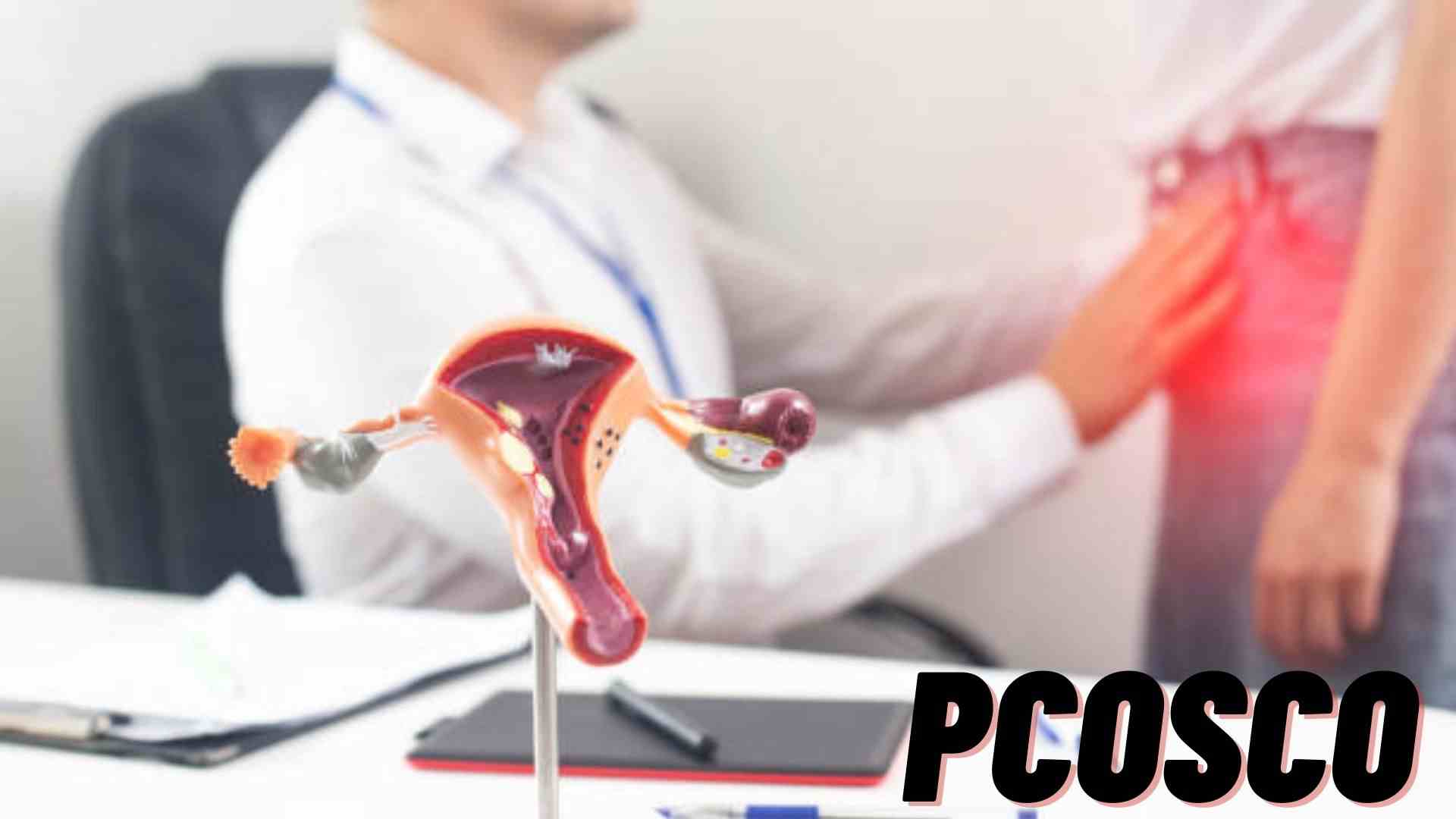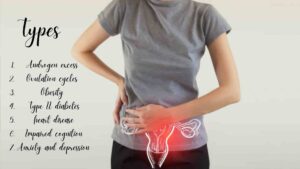PCOSCO: Polycystic Ovarian Syndrome Symptom & Treatment

Increasing Women disease is a serious concern in all around the world. One of which is Polycystic Ovarian Syndrome known as PCOSCO. Its women disease, common but can be serious if untreated. So, In this article, we will look at comorbidities in PCOSCO, specifically those related to fertility. We’ll talk about how acne and weight gain can affect fertility, as well as how polycystic ovaries can affect other health conditions like diabetes and heart health. Finally, we will discuss how to manage comorbidities in PCOS.
What is PCOSCO or PCOS?
PCOS, also known as a polycystic ovarian syndrome, is a common hormonal condition in women. It is distinguished by the ovaries’ excessive androgen production. Androgen levels in women are typically low. The increase causes a slew of health issues and poses significant risks to PCOSCO patients.

How does the syndrome develop?
Polycystic ovary syndrome occurs when the ovaries develop a large number of small cysts. These cysts contain fluid. Some PCOSCO women have no cysts. Ovulation occurs when an egg is released from an ovary. This occurs so that male sperm can fertilize it. If the egg is not fertilized, it exits the body during a woman’s period.
In extremely rare cases, a woman may not produce enough hormones to ovulate. When a woman does not ovulate, her ovaries may produce a large number of small cysts. Androgen hormones have been produced by these cysts. Women with PCOS frequently have high levels of androgens in their bodies. It results in irregular periods and other PCOSCO-related issues.
Symptoms and Signs
PCOSCO has many signs and symptoms, but the most common are irregular periods, infertility, weight gain, and acne. While there is no one-size-fits-all treatment for PCOS, there are many treatments that can help alleviate symptoms.
If you have any of the signs or symptoms of PCOS, you should see your doctor to see if you have the condition and if there is anything you can do to improve your quality of life.
The Different Types of PCOSCO
There are numerous types, each with its own set of co-occurring conditions.
Among the most common comorbidities are:
- Androgen excess Insulin sensitivity (high levels of male hormones)
- Ovulation cycles (lack of ovulation)
- Obesity or being overweight
- Type II diabetes
- heart disease
- Impaired cognition
- Anxiety and depression are examples of mental illnesses.

PCOS Comorbidities
The syndrome has been linked to an increased risk of developing other diseases such as diabetes, obesity, and heart disease.
The PCOSCO profile has not been thoroughly researched, but research indicates that a number of other health conditions commonly co-occur with PCOS. These are some of the conditions:
Obesity
It is a fairly common comorbidity. This is most likely because obesity is linked to an increased risk of developing type 2 diabetes and other chronic diseases like heart disease, stroke, and cancer.

Diabetes mellitus type 2
Another common comorbidity is diabetes. This is because diabetes increases the risk of developing pregnancy complications such as gestational diabetes and high blood pressure. Furthermore, it causes insulin resistance, which is a major factor in the development of PCOSCO.
Diabetes occurs during pregnancy
It affects roughly half of all women who develop polycystic ovary syndrome. Gestational diabetes usually goes away after childbirth, but it can sometimes lead to type II diabetes later in life.
Blood pressure is high
A common comorbidity in PCOS is hypertension. This is because hypertension raises your chances of developing cardiovascular disease, which is the leading cause of death in women. Furthermore, hypertension can lead to other health issues such as diabetes and obesity.
Diagnosis of hypertension in women with PCOSCO can be challenging because symptoms may not appear until the condition is severe. Hypertension symptoms in PCOS women include:
- Heavy menstrual cycles
- nauseousness or vomiting
- Extreme exhaustion
- A rapid heart rate
- Fluid accumulation on the body (edema)
- If you have any of these symptoms, see your doctor for a diagnosis and treatment plan.

Obstructive sleep apnea (OSA)
Obstructive sleep apnea is a condition in which people repeatedly stop breathing during sleep, most often due to an airway collapse. This can result in weight gain, inflammation, and diabetes.
This condition is more common in women than in men, and it is also more common in PCOS patients. People with PCOS frequently have elevated testosterone levels, which can contribute to the development of obstructive sleep apnea. Obstruction in sleep apnea is usually caused by an accumulation of tissue around the airway. This tissue can make it difficult for air to flow freely through the airway, resulting in recurrent breathing stops and starts.
Anxiety or depression
Polycystic ovaries can lead to weight gain, which increases stress hormone levels. Women with PCOS are also more anxious than women who do not have the condition. This is most likely because PCOS can cause infertility and difficulty regulating hormones. Women are also prone to mood swings, which can leave them feeling anxious or depressed.
Prevention of PCOSCO
PCOS is a condition that primarily affects women of reproductive age. It’s a hormonal issue that can cause high blood pressure, obesity, and difficulty getting pregnant. There are numerous things you can do to help control your condition. Here are five preventative measures:
- Consume a well-balanced diet. Consume an adequate number of fruits and vegetables, whole grains, and lean protein sources.
- Engage in regular physical activity. Not only does exercise help you lose weight and improve your overall health, but it also helps to normalize your hormone levels and lower your risk of developing PCOSCO.
- Reduce the amount of stress in your life. Stress can cause hormonal fluctuations, which can lead to PCOSCO symptoms. Spend some time each day relaxing and de-stressing; this will aid in the regulation of your body’s natural cycle.
- Seek treatment for any medical conditions that may be causing PCOSCO symptoms. Thyroid disease and diabetes can disrupt hormone balance, leading to the development of polycystic ovary syndrome.
- Keep a diary of your menstrual cycles for at least two years to track any changes in your symptoms and your progress towards prevention.
Possible Treatment
The best treatment plan for polycystic ovary syndrome will vary depending on the individual’s symptoms and medical history. However, some common PCOSCO treatment options include:

- Pills for birth control
The pill can aid in the regulation of menstrual cycles and reduce the number of eggs released by the ovaries. To treat PCOSCO, combined oral contraceptives (COCs) containing ethinyl estradiol and norethindrone are most commonly used. These medications work by preventing ovulation, which may reduce the risk of developing ovarian cancer. Birth control pill side effects can include mood swings, weight gain, and missed periods.
- Weight reduction
Weight loss is an important part of treating PCOSCO because it can improve insulin sensitivity and reduce the amount of acne and other skin issues that are commonly associated with this condition. In some cases, gastric bypass surgery or other weight-loss surgery may be required. Reduced sugar intake, fewer processed foods, and increased fiber consumption may also help to improve PCOSCO symptoms.
- Metformin
Metformin is a type of diabetes medication that has been shown to be effective in lowering testosterone levels in women with PCOS. It can also reduce insulin resistance, which may improve blood sugar control and lower the risk of developing diabetes later in life in people with PCOSCO. Metformin has only a few side effects, which typically include nausea, diarrhea, and lactic acidosis.
Food to be consumed
The foods you should eat to treat PCOSCO symptoms are listed below.
Vegetables with green leaves
Green leafy vegetables are an excellent addition to any diet. Because they are nutrient-dense and low in calories, they are ideal for nutrition and weight loss. Green leafy vegetables, such as kale or spinach, contain high levels of Vitamin B and are thus beneficial to PCOS patients. Surprisingly, a lack of vitamin B has been discovered in more than 80% of PCOS patients.
Consume a low-glycemic-index diet (GI)
Low-GI meals are digested more slowly by the body, so they do not raise insulin levels as much or as quickly as other foods, such as carbohydrates. A low GI diet includes whole grains, legumes, nuts, seeds, fruits, starchy vegetables, and other unprocessed, low-carbohydrate foods.
The Good Fats
PCOSCO is not always caused by obesity. Furthermore, fats are not always bad for you. Many healthy fats, such as avocados and fatty fish, can be included in your diet and are necessary for eating with PCOSCO.
Healthy fats contain fatty acids, which are essential for the maintenance of cell membranes. They are also essential for maintaining a healthy hormone balance and controlling weight.
Fatty acids are essential for both pregnancy and fertility, which are major issues for PCOS women. The fatty acid omega 3, found in foods such as fish and flax seeds, aids in hormone balance.
Conclusion
Polycystic ovary syndrome (PCOS) is a common endocrine system disorder that can lead to a variety of serious health issues. Although there is no cure for PCOSCO, early diagnosis and treatment can help manage symptoms and reduce the risk of developing other health problems. If you suspect you have PCOSCO, consult your doctor about getting tested.
For more info visit techstarlink.com





